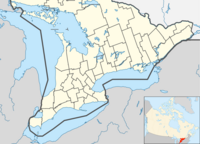Brockton is a municipality in the Canadian province of Ontario, located in Bruce County. As of 2021[update], the population was 9,784.[1]
Brockton | |
|---|---|
| Municipality of Brockton | |
 St. Michael Church remains, Brant | |
| Coordinates: 44°10′N 81°13′W / 44.167°N 81.217°W | |
| Country | Canada |
| Province | Ontario |
| County | Bruce |
| Settled | 1848 |
| Formed | January 1, 1999 |
| Government | |
| • Mayor | Chris Peabody |
| • Federal riding | Huron—Bruce |
| • Prov. riding | Huron—Bruce |
| Area | |
| • Land | 564.64 km2 (218.01 sq mi) |
| Population (2021)[1] | |
| • Total | 9,784 |
| • Density | 17.3/km2 (45/sq mi) |
| Time zone | UTC−05:00 (EST) |
| • Summer (DST) | UTC−04:00 (EDT) |
| Postal Code FSA | N0G |
| Area code(s) | 519 and 226 |
| Website | www |
The current municipality was formed on January 1, 1999, by amalgamating the former township of Brant, former township of Greenock and the town of Walkerton. Brockton's name was formed as a portmanteau of the three merged municipalities (Brant Greenock Walkerton).
Communities
editCommunities in the Municipality of Brockton include the former town of Walkerton and the villages within the boundaries of the two former Brant and Greenock Townships: Bradley, Cargill, Chepstow, Dunkeld, Eden Grove, Glammis, Greenock, Little Egypt, Malcolm, Maple Hill, Narva, Marle Lake, Lake Rosalind, Pearl Lake, Pinkerton, Portal, Riversdale and Solway.
Demographics
editIn the 2021 Census of Population conducted by Statistics Canada, Brockton had a population of 9,784 living in 4,032 of its 4,406 total private dwellings, a change of 3.4% from its 2016 population of 9,461. With a land area of 564.64 km2 (218.01 sq mi), it had a population density of 17.3/km2 (44.9/sq mi) in 2021.[1]
| 2021 | 2016 | 2011 | |
|---|---|---|---|
| Population | 9,784 (+3.4% from 2016) | 9,461 (+0.3% from 2011) | 9,432 (-2.2% from 2006) |
| Land area | 564.64 km2 (218.01 sq mi) | 565.18 km2 (218.22 sq mi) | 565.41 km2 (218.31 sq mi) |
| Population density | 17.3/km2 (45/sq mi) | 16.7/km2 (43/sq mi) | 16.7/km2 (43/sq mi) |
| Median age | 44.8 (M: 43.6, F: 46.0) | 46.2 (M: 45.0, F: 47.5) | 45.0 (M: 44.4, F: 45.5) |
| Private dwellings | 4,406 (total) 4,032 (occupied) | 4,252 (total) | 4,157 (total) |
| Median household income | $84,000 | $67,597 |
| Year | Pop. | ±% |
|---|---|---|
| 2001 | 9,658 | — |
| 2006 | 9,641 | −0.2% |
| 2011 | 9,432 | −2.2% |
| 2016 | 9,461 | +0.3% |
| 2021 | 9,784 | +3.4% |
| Source: Statistics Canada[7] | ||
Population trend prior to amalgamation:
- Population total in 1996: 10,163
- Brant (township): 3,455
- Greenock (township): 1,672
- Walkerton (town): 5,036
- Population in 1991:
- Brant (township): 3,420
- Greenock (township): 1,741
- Walkerton (town): 4,939
Mother tongue (2021):[1]
- English as first language: 95.8%
- French as first language: 0.4%
- English and French as first language: 0.3%
- Other as first language: 3.0%
Government
editList of former mayors:
- David Thomson (1999–2003)
- Charlie Bagnato (2003–2010)
- David Inglis (2010–2018)
- Chris Peabody (2018–present)
See also
editReferences
edit- ^ a b c d e "Brockton, Ontario (Code 3541032) Census Profile". 2021 census. Government of Canada - Statistics Canada. Retrieved 2024-10-04.
- ^ "2021 Community Profiles". 2021 Canadian census. Statistics Canada. February 4, 2022. Retrieved 2023-10-19.
- ^ "2016 Community Profiles". 2016 Canadian census. Statistics Canada. August 12, 2021. Retrieved 2019-06-10.
- ^ "2011 Community Profiles". 2011 Canadian census. Statistics Canada. March 21, 2019. Retrieved 2012-08-09.
- ^ "2006 Community Profiles". 2006 Canadian census. Statistics Canada. August 20, 2019.
- ^ "2001 Community Profiles". 2001 Canadian census. Statistics Canada. July 18, 2021.
- ^ 1996, 2001, 2006 census
External links
edit- Brockton, Ontario travel guide from Wikivoyage
- Official website

